
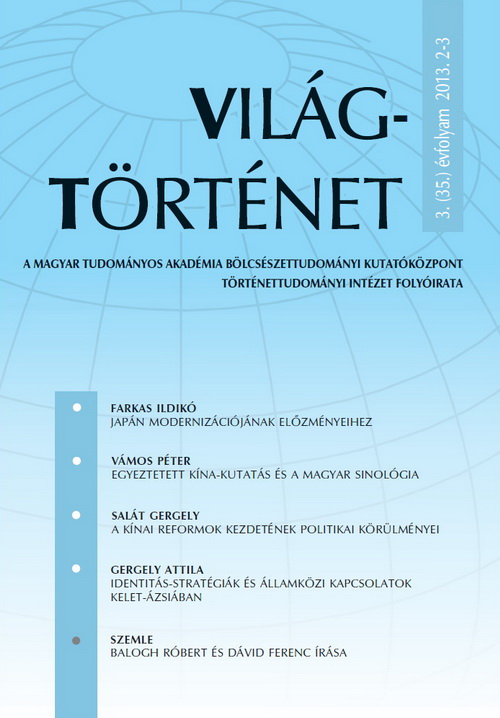 The growing economic and political significance of the East Asian region makes it necessary for a small European country like Hungary to start training well-prepared experts who combine wide historical and cultural knowledge on this region with up-to-date information concerning the political and economic relations between the East Asian countries. The editorial board of Világtörténet, the only Hungarian language academic journal entirely devoted to world history, has decided to strengthen its commitment to this region by putting together a thematic issue on East Asia. The articles of the current issue deal with some of the more important questions envisaging the contemporary history of the East Asian region, such as the economic modernization, the impact of the Western social model and urban planning, but also the national and territorial conflicts among regional powers of this area. We are confident that this effort will bring closer the historical debate on this crucial emerging area to the Hungarian public, and will also stimulate a new wave of research and analysis on the Asian continent.
The growing economic and political significance of the East Asian region makes it necessary for a small European country like Hungary to start training well-prepared experts who combine wide historical and cultural knowledge on this region with up-to-date information concerning the political and economic relations between the East Asian countries. The editorial board of Világtörténet, the only Hungarian language academic journal entirely devoted to world history, has decided to strengthen its commitment to this region by putting together a thematic issue on East Asia. The articles of the current issue deal with some of the more important questions envisaging the contemporary history of the East Asian region, such as the economic modernization, the impact of the Western social model and urban planning, but also the national and territorial conflicts among regional powers of this area. We are confident that this effort will bring closer the historical debate on this crucial emerging area to the Hungarian public, and will also stimulate a new wave of research and analysis on the Asian continent.
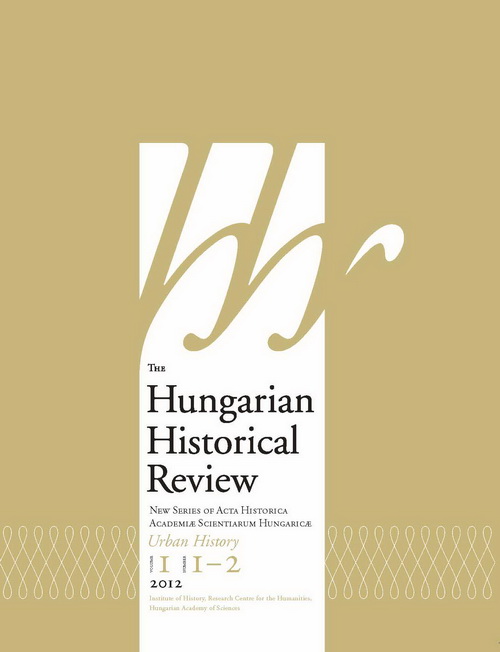 The Institute of History of the Research Centre for the Humanities of the Hungarian Academy of Sciences launched a new scholarly journal dealing with Hungarian history in English language. The premiere of the journal was held on February 26, 2013, where it was introduced and reviewed by László Kontler, Professor of the Central European University, Budapest.
The Institute of History of the Research Centre for the Humanities of the Hungarian Academy of Sciences launched a new scholarly journal dealing with Hungarian history in English language. The premiere of the journal was held on February 26, 2013, where it was introduced and reviewed by László Kontler, Professor of the Central European University, Budapest.
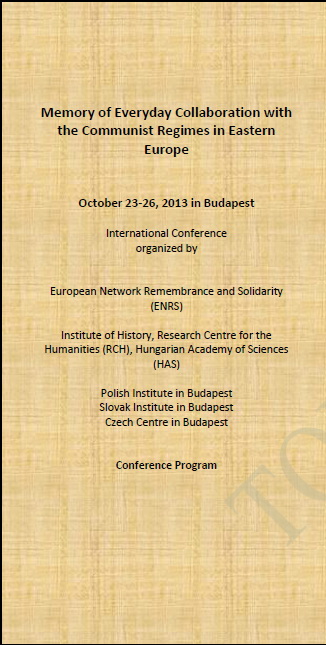 An international conference entitled "Memory of Everyday Collaboration with the Communist Regimes in Eastern Europe" will be organized by the Institute of History of the Research Centre for the Humanities (RCH), HAS and the European Network Remembrance and Solidarity (ENRS) between 23 and 26 October 2013 at the Institute of History (RCH, HAS) and the Polish Institute (1065 Budapest, Nagymező u. 15.).
An international conference entitled "Memory of Everyday Collaboration with the Communist Regimes in Eastern Europe" will be organized by the Institute of History of the Research Centre for the Humanities (RCH), HAS and the European Network Remembrance and Solidarity (ENRS) between 23 and 26 October 2013 at the Institute of History (RCH, HAS) and the Polish Institute (1065 Budapest, Nagymező u. 15.).
More information and the program of the conference can be read here.
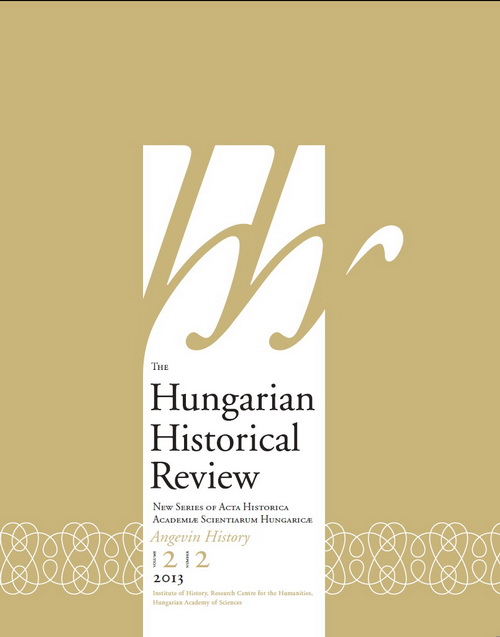 The second issue of Volume 2 (2013) of The Hungarian Historical Review (Angevin History) has been published!
The second issue of Volume 2 (2013) of The Hungarian Historical Review (Angevin History) has been published!
Annual subscriptions: $80/€60 ($100/€75 for institutions), postage excluded.
For Hungarian institutions HUF7900 per year, postage included.
Single copy $25/€20. For Hungarian institutions HUF2000.
Send orders to The Hungarian Historical Review, H-1250 Budapest, P.O. Box 9. Hungary; e-mail: .
For more information about the contents of this issue and about the journal please visit the homepage http://www.hunghist.org/.
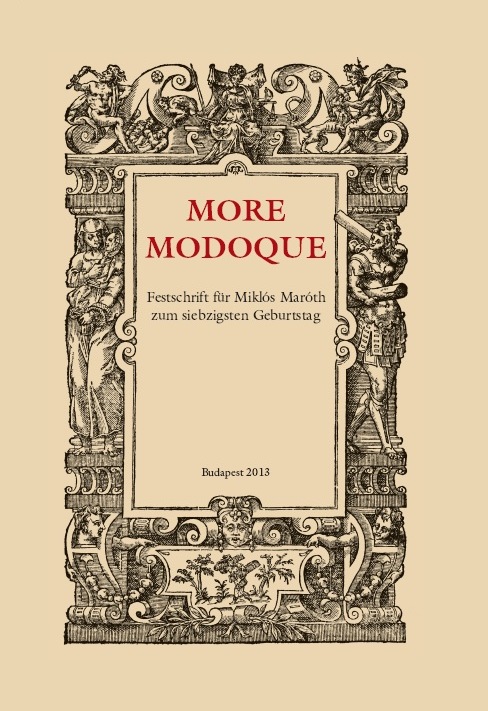 The volume of essays entitled More modoque. Die Wurzeln der europäischen Kultur und deren Rezeption im Orient und Okzident has been published by the Research Centre for the Humanities of the Hungarian Academy of Sciences with the contribution of the Research Centre for Ancient Studies (MTA Ókortudományi Kutatócsoport) in the honour of the classical philologist and prominent scholar of orientalism, Prof. Miklós Maróth on his 70th birthday. The papers have been selected and edited by Pál Fodor, Gyula Mayer, Martina Monostori, Kornél Szovák and László Takács. The contents can be read here.
The volume of essays entitled More modoque. Die Wurzeln der europäischen Kultur und deren Rezeption im Orient und Okzident has been published by the Research Centre for the Humanities of the Hungarian Academy of Sciences with the contribution of the Research Centre for Ancient Studies (MTA Ókortudományi Kutatócsoport) in the honour of the classical philologist and prominent scholar of orientalism, Prof. Miklós Maróth on his 70th birthday. The papers have been selected and edited by Pál Fodor, Gyula Mayer, Martina Monostori, Kornél Szovák and László Takács. The contents can be read here.
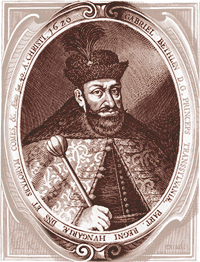 The series of the programs of the Bethlen Memorial Year has been designed to introduce and present the historical role and activities of Gabriel Bethlen to a wider audience, inside and beyond our state borders, with an organised, coordinated and directed cooperation of different disciplines. Our aim is to provide more information and better understanding about Gabriel Bethlen and his age to the public in Hungary and abroad. There are several volumes in English, German and French reflecting the interpretation of the neighbouring countries about Bethlen; however, there are only a few Hungarian-language summaries. The Bethlen Memorial Year may lead to make our national history and a proud and successful image of the Hungarians better known throughout Europe.
The series of the programs of the Bethlen Memorial Year has been designed to introduce and present the historical role and activities of Gabriel Bethlen to a wider audience, inside and beyond our state borders, with an organised, coordinated and directed cooperation of different disciplines. Our aim is to provide more information and better understanding about Gabriel Bethlen and his age to the public in Hungary and abroad. There are several volumes in English, German and French reflecting the interpretation of the neighbouring countries about Bethlen; however, there are only a few Hungarian-language summaries. The Bethlen Memorial Year may lead to make our national history and a proud and successful image of the Hungarians better known throughout Europe.
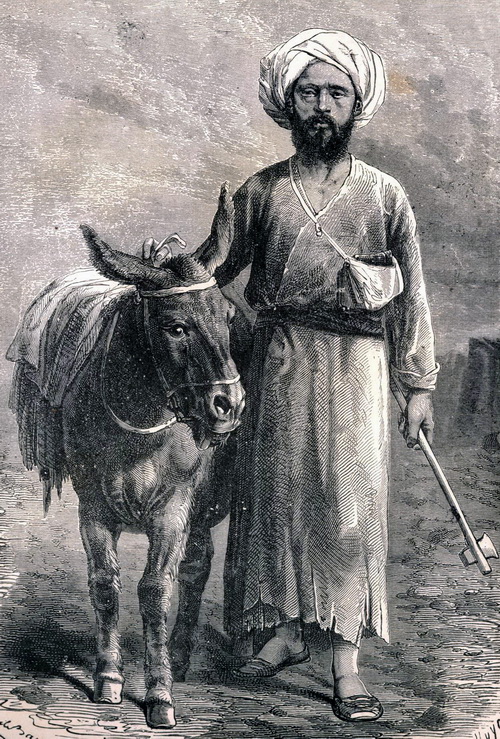 An international conference was organized by the Arminius Vámbéry Centennial Committee, the Eötvös Loránd University and the Research Centre for the Humanities on September 13, 2013, on the 100th Anniversary of Arminius Vámbéry’s Death in Budapest, as a part of the Hungarian and international programs of the Vámbéry Memorial Year. Ármin Vámbéry (1832–1913), a Hungarian orientalist, Turkologist and traveller died a hundred years ago. A week earlier, the first of the series of scholarly events was organized in Ankara by the Turkish Linguistic Society, after this conference, the Istanbul University will have a commemoration, then a conference will be held in Iran and finally in Dunaszerdahely, where Vámbéry spent his childhood. (For the Hungarian series of events, see here.)
An international conference was organized by the Arminius Vámbéry Centennial Committee, the Eötvös Loránd University and the Research Centre for the Humanities on September 13, 2013, on the 100th Anniversary of Arminius Vámbéry’s Death in Budapest, as a part of the Hungarian and international programs of the Vámbéry Memorial Year. Ármin Vámbéry (1832–1913), a Hungarian orientalist, Turkologist and traveller died a hundred years ago. A week earlier, the first of the series of scholarly events was organized in Ankara by the Turkish Linguistic Society, after this conference, the Istanbul University will have a commemoration, then a conference will be held in Iran and finally in Dunaszerdahely, where Vámbéry spent his childhood. (For the Hungarian series of events, see here.)
Page 7 of 12